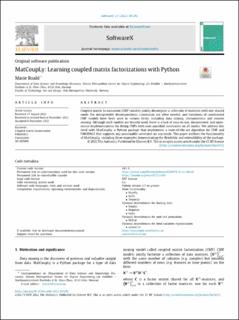| dc.contributor.author | Roald, Marie | |
| dc.date.accessioned | 2023-02-21T08:13:38Z | |
| dc.date.available | 2023-02-21T08:13:38Z | |
| dc.date.created | 2023-02-07T06:57:34Z | |
| dc.date.issued | 2023-01-04 | |
| dc.identifier.issn | 2352-7110 | |
| dc.identifier.uri | https://hdl.handle.net/11250/3052545 | |
| dc.description.abstract | Coupled matrix factorization (CMF) models jointly decompose a collection of matrices with one shared mode. For interpretable decompositions, constraints are often needed, and variations of constrained CMF models have been used in various fields, including data mining, chemometrics and remote sensing. Although such models are broadly used, there is a lack of easy-to-use, documented, and open-source implementations for fitting CMFs with user-specified constraints on all modes. We address this need with MatCoupLy, a Python package that implements a state-of-the-art algorithm for CMF and PARAFAC2 that supports any proximable constraint on any mode. This paper outlines the functionality of MatCoupLy, including three examples demonstrating the flexibility and extendibility of the package. | en_US |
| dc.language.iso | eng | en_US |
| dc.publisher | Elsevier | en_US |
| dc.relation.ispartofseries | SoftwareX;Volume 21, February 2023, 101292 | |
| dc.rights | Navngivelse 4.0 Internasjonal | * |
| dc.rights.uri | http://creativecommons.org/licenses/by/4.0/deed.no | * |
| dc.title | MatCoupLy: Learning coupled matrix factorizations with Python | en_US |
| dc.type | Peer reviewed | en_US |
| dc.type | Journal article | en_US |
| dc.description.version | publishedVersion | en_US |
| dc.rights.holder | © 2022 The Author(s) | en_US |
| dc.source.articlenumber | 101292 | en_US |
| cristin.ispublished | true | |
| cristin.fulltext | original | |
| cristin.qualitycode | 1 | |
| dc.identifier.doi | https://doi.org/10.1016/j.softx.2022.101292 | |
| dc.identifier.cristin | 2123512 | |
| dc.source.journal | SoftwareX | en_US |
| dc.source.volume | 21 | en_US |
| dc.source.issue | 21 | en_US |
| dc.source.pagenumber | 1-9 | en_US |

